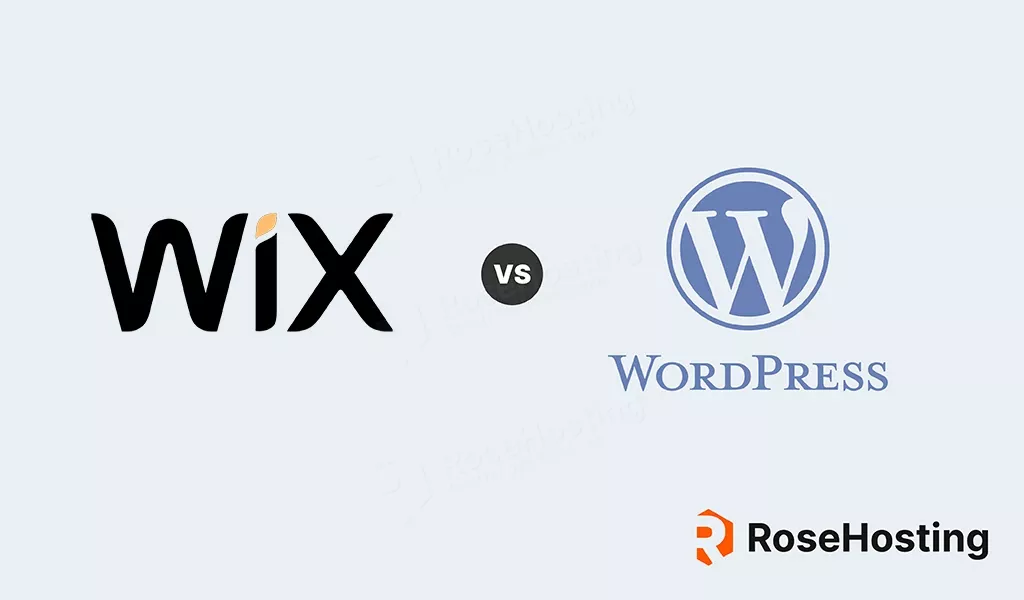
In this comprehensive guide, we’ll delve into the intricate world of WordPress vs. Wix, comparing their key features, customization options, ease of use, scalability, and overall performance. By understanding the unique characteristics of these platforms, you’ll gain valuable insights that will help you make an informed decision about the best platform for your blog or website.
Establishing an online presence is paramount for bloggers and content creators. With a multitude of platforms available, it can be overwhelming to select the ideal one for your blog. Among the top contenders in the website-building sphere are WordPress and Wix, both renowned for their user-friendly interfaces and powerful features. However, when it comes to WordPress vs. Wix, the decision isn’t as simple as picking one over the other. Each platform offers distinct advantages and caters to different needs, making it crucial to evaluate their strengths and weaknesses when embarking on your blog journey.
Table of Contents
Introduction to WordPress and Wix
Before we delve deep into the comparison, it’s essential to understand what these platforms are and what they offer.
What is WordPress?
WordPress is a free and open-source CMS that was released in 2003. Over the years, it has become the most popular CMS worldwide, powering millions of websites. The platform is known for its robust features and extreme customization capabilities, making it a top choice for businesses, bloggers, and developers.
WordPress comes in two forms: WordPress.com (a hosted solution) and WordPress.org (a self-hosted solution). This comparison focuses on the self-hosted version, which offers more flexibility and control.
With WordPress, you have complete control over your website’s design, functionality, and content. You can choose from a vast library of themes and plugins to customize your site to your heart’s content.
WordPress has a huge library of plugins, among which are website builders that help in making your own website look and feel unique.
Whether you’re a beginner or an experienced developer, WordPress provides the tools and resources you need to create a professional and dynamic website.
What is Wix?
Wix, on the other hand, is a website builder and web hosting provider launched in 2006. Unlike WordPress, it’s a fully hosted platform, meaning you don’t have to buy hosting or install anything. This makes it an attractive choice for those who want a hassle-free website-building experience.
Wix comes with a drag-and-drop builder that simplifies the process of creating websites. With its user-friendly interface, even individuals with no coding knowledge can easily design and launch their own websites. Wix offers a wide range of templates to choose from, catering to various industries and styles.
One of the key advantages of Wix is its ease of use. The platform provides a seamless and intuitive website-building experience, allowing you to focus on your content and design without getting bogged down by technical details.
Whether you’re a small business owner, a freelancer, or an artist showcasing your work, Wix offers the tools and features to bring your vision to life.
Furthermore, Wix offers a range of additional services and features, such as eCommerce functionality, SEO tools, and marketing integrations, to help you grow your online presence and reach your target audience.
Now that we have a basic understanding of what WordPress and Wix are, let’s dive deeper into the comparison to see how they stack up against each other in terms of features, customization options, pricing, and more.
WordPress vs. Wix: Ease of Use
When it comes to ease of use, WordPress and Wix both have their merits and clear distinctions between the two. Let’s break them down:
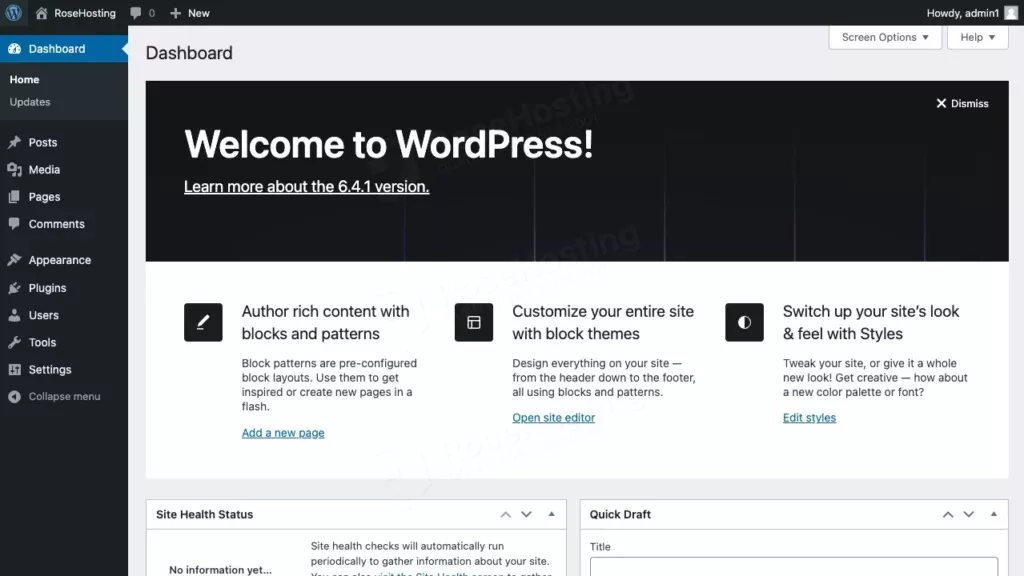
WordPress: Ease of Use
WordPress offers a dashboard-centric approach. The backend, where you manage your content and site settings, is separate from the front end where you view the site. While powerful, this segregation can be confusing for beginners, making it harder to visualize the final results.
The platform relies heavily on themes and plugins. While this gives you a world of customization possibilities, it also introduces complexity. To shape the site as per your vision, you might need to juggle multiple plugins and sometimes dive into code.
When it comes to themes, WordPress offers a wide selection, both free and paid. However, selecting and customizing them requires navigating through multiple options and settings. There can be a steep learning curve to get them to look exactly as you want.
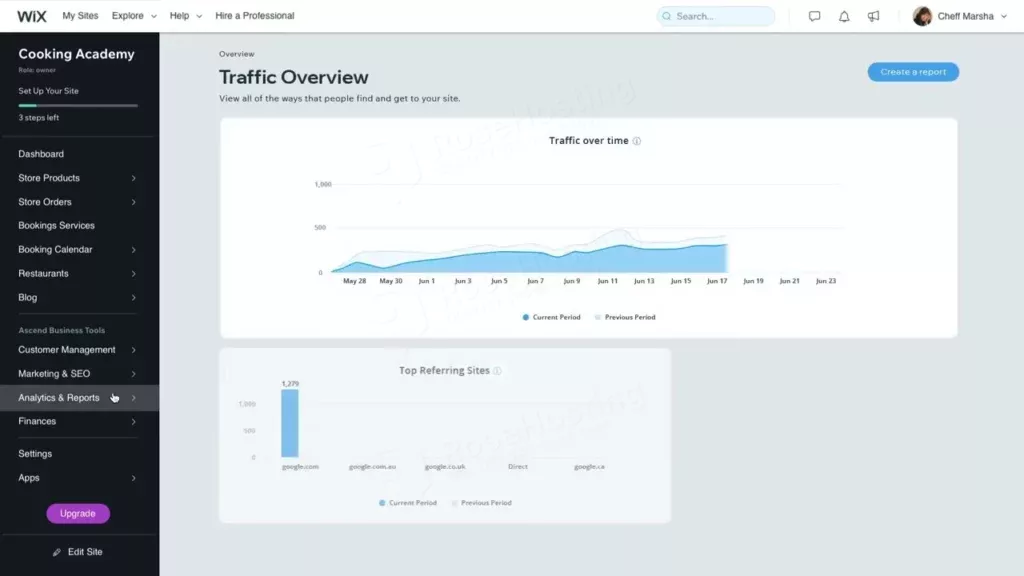
Wix: Ease of Use
Wix also has a dashboard interface where you can manage your websites, and settings, see analytics, and so on. Their editor sports a WYSIWYG (What You See Is What You Get) editor. This means you create and edit your website in a visual interface that closely mirrors how it appears to visitors. This real-time visual feedback is easier for those who like to see instant results.
Website builder plugins such as Divi, Elementor, and Oxygen help WordPress behave how Wix does, giving you a comparable webpage editing experience.
With its drag-and-drop functionality, Wix and WordPress builder plugins empower users to add elements (like images, text, and videos) effortlessly. There’s no need to understand coding, making the customization process smooth and intuitive. Wix also provides a wide selection of professionally designed templates that are easy to tweak. Each template is fully responsive and designed with modern aesthetics in mind, allowing users to create a stylish site without fuss.
When it comes purely to the ease of use and default configurations, Wix takes the crown. Its intuitive drag-and-drop editor, combined with a streamlined customization process and solid onboarding, makes it a standout choice for those venturing into website building for the first time. While WordPress is immensely powerful and versatile, its steeper learning curve can be a hurdle for newcomers. Utilizing plugins that help make the experience easier can help make WordPress as easy to use as Wix.
For beginners prioritizing a hassle-free, user-friendly experience, Wix and WordPress with a website builder come in as a tie. Wix offers premium templates to start with, while WordPress offers extensive capabilities not available in Wix that are worth the initial time investment.
WordPress vs. Wix: Flexibility and Customization
Customization is where WordPress truly shines and sets itself apart from most other website builders. With WordPress, you’re not confined to predefined layouts or limited design choices. You have the freedom to transform your website into a digital masterpiece that aligns perfectly with your brand and vision.
The WordPress Customizer allows you to tweak everything from fonts and colors to header styles and background images. But the real beauty is in its plugin ecosystem. Plugins like Elementor, Beaver Builder, and Divi provide advanced drag-and-drop capabilities, letting you construct pages with pixel-level precision. You can create intricate layouts, add dynamic content, and even design your own headers and footers.
WIx’s customization options are impressive within the context of a drag-and-drop builder. While it might not offer the same level of code-level customization as WordPress, it excels at providing a user-friendly interface for tweaking designs. Elements can be easily resized, repositioned, and styled without needing any coding knowledge.
However, where Wix might fall short for those seeking deep customization is its inability to allow direct code modifications. If you’re a developer or have coding expertise, you might find the limitations frustrating.
Winner: WordPress gains the upper hand in customization and control due to its plugin capabilities, enabling users to craft intricate and personalized websites.
Price Comparison: Wix vs. WordPress
WordPress Costs
The cost of using WordPress involves multiple factors. The WordPress software is open source and free, but additional expenses come into play when you consider hosting, domain registration, premium themes, and plugins.
Hosting – These fees can range from a few dollars a month to hundreds of dollars a month. This will vary depending on how many resources you plan on having. We recommend staying away from providers that have arbitrary limitations. In fact, we are the Saints of Hosting™ in this aspect, since we don’t limit your websites in any way, even with our WordPress hosting plans.
WordPress.com also offers a free hosting tier, but you can’t use your own domain name. The features are more limited compared to hosting WordPress yourself. It’s free hosting, so that’s not surprising at all.
Domain – Domain registration fees can range from a few dollars to a few hundred dollars per year, depending on the domain name you choose.
Themes and Plugins – While there are free themes and plugins available, premium themes and plugins often offer more features and customization options. These can range from $30 to $100 or even more. Most of these are one-time payments, so your costs don’t add up over time.
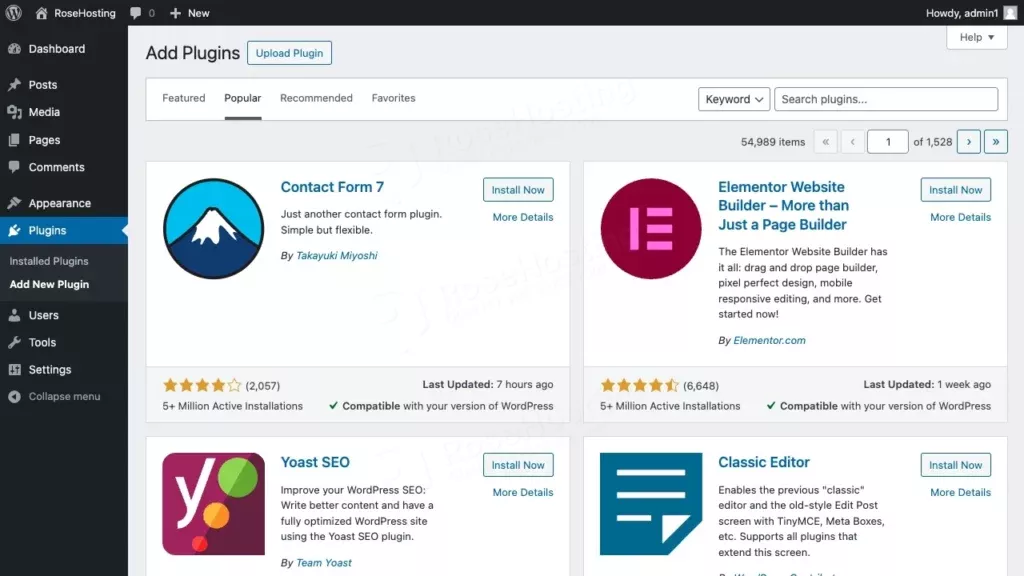
Overall, the costs associated with a WordPress site can be flexible, allowing you to tailor your expenses based on your needs and budget.
Wix Costs
Hosting – Wix adopts a streamlined pricing structure. It offers a range of plans, each with its own features and limitations.
- Free Plan – Wix offers a free plan, but it comes with Wix ads displayed on your site and very limited storage and bandwidth.
- Paid Plans – Paid plans remove ads and provide more storage, bandwidth, and features. Pricing varies based on the plan you choose, with costs typically ranging from $14 to $35 per month.
Domain – Domain registration fees are not included with the Wix plan, so you will need to pay extra for a domain.
Plugins – Referred to as Apps by Wix, you can expand your website’s functionality using these modules. Some are free and some are paid, however, the price is not made clear when visiting the App market, which is a bad look for price transparency.
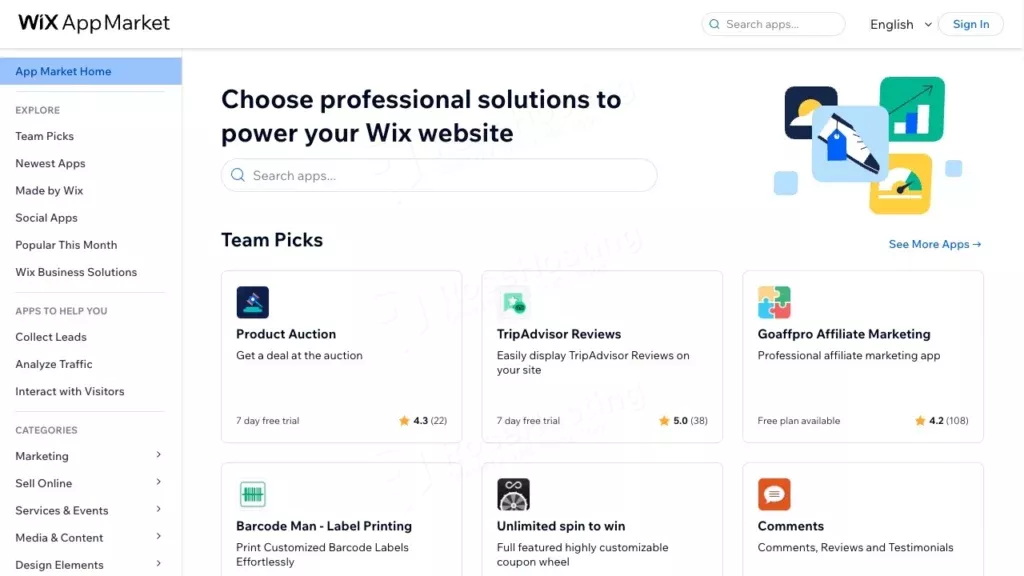
Cost Winner
While there is a big difference in pricing depending on what plan level you’re using if you shop around and find affordable WordPress hosting, you’ll have low monthly expenses and very few to no one-time costs. There is also a free version of WordPress hosting though you cannot use your own domain, nor transfer that site in the future so it’s not a good idea if you plan on growing your site over time. Wix can be cheaper depending on what features you need, but that won’t be the case for all websites. If you plan on expanding and growing your site over time, including a larger audience, more pages, and more users, their monthly subscriptions can really start to add up. There is a very low barrier to entry at the cheapest price points, but as you grow Wix is far from a good value, and can in fact become far too expensive for what you actually get. For those reasons, we’ll have to call this a win for WordPress.
Wix vs. WordPress: Blogging Capabilities
Both WordPress and Wix recognize the significance of effective blogging capabilities, but they offer distinct approaches to cater to diverse blogging needs. Let’s delve into the blogging features of each platform to unveil who takes the win in this area.
WordPress Blogging
WordPress has a legendary reputation in the blogging world, having started as a dedicated blogging platform. As a result, its blogging capabilities are robust and versatile:
- Advanced Content Management: WordPress’s content management system (CMS) offers a user-friendly interface for crafting, editing, and organizing blog posts. The Gutenberg editor, introduced in recent versions, simplifies the process with intuitive block-based content creation.
- Categories and Tags: WordPress allows you to categorize and tag your posts, enhancing content organization and navigation for readers.
- Customizable Permalinks: You have control over your post URLs, enabling you to create SEO-friendly permalinks that enhance search engine visibility.
- SEO Optimization: WordPress’s SEO plugins like Yoast SEO and RankMath empower you to optimize your blog posts for search engines, from meta tags to readability analysis.
- Integrated Social Sharing: Sharing your blog content across social media platforms is seamless with WordPress’s integrated social sharing buttons.
Wix Blogging
Wix might have started as a website builder, but its blogging features have significantly improved over the years:
- Visual Content Creation: Wix’s intuitive drag-and-drop editor extends to its blogging capabilities. You can easily create visually engaging blog posts by incorporating images, videos, and other multimedia elements.
- Mobile Responsiveness: Wix ensures your blog posts look impeccable on both desktop and mobile devices, catering to the diverse browsing habits of your audience.
- Integrated Apps: Wix offers a variety of apps that enhance blogging capabilities. These range from adding social media feeds to embedding forms for reader engagement.
- SEO Tools: While Wix’s SEO capabilities have evolved, they might not be as advanced as WordPress’s. However, you can optimize individual blog posts for SEO by customizing titles, descriptions, and headers.
In the blogging capabilities arena, WordPress emerges as the winner due to its heritage as a blogging platform and its comprehensive set of features tailored for bloggers. The ability to fine-tune SEO, manage content with ease, and integrate a plethora of plugins for added functionality grants WordPress users an edge in creating and managing compelling blog content.
Wix, on the other hand, caters more effectively to those who prioritize visual elements in their blogs. Its drag-and-drop interface and mobile responsiveness provide an advantage for bloggers seeking a more visual and interactive approach to content creation.
eCommerce: Wix vs. WordPress
With the right plugins, WordPress transforms into a potent eCommerce platform. WooCommerce, the most popular eCommerce plugin, equips you with all the tools needed to set up and manage an online store. From product listings and inventory management to secure payment gateways and shipping options, WooCommerce covers the entire spectrum of eCommerce needs.
The ability to customize every aspect of your online store, from product pages to checkout processes, gives WordPress a significant edge in the eCommerce area.
Wix, being an all-in-one platform, offers native eCommerce functionality. While it might not offer the same level of customization and flexibility as WordPress, it provides an accessible solution for smaller online stores.
Wix’s eCommerce features include product listings, secure payment gateways, and inventory management, making it suitable for those looking to start a relatively simple online store.
Winner: WordPress is the easy winner for eCommerce, thanks to the extensive capabilities offered by plugins like WooCommerce.
SEO: WordPress vs. Wix
WordPress SEO
When it comes to Search engine optimization, WordPress is the leader in the website-building arena. Its architecture, clean code, and customizable permalinks make it inherently SEO-friendly from the ground up. But what truly sets WordPress apart is its array of SEO-focused plugins.
- Yoast SEO – perhaps the most renowned WordPress plugin for SEO. It provides an arsenal of tools to optimize your content for search engines. From crafting SEO-friendly meta titles and descriptions to generating XML sitemaps, Yoast guides you through every step of on-page optimization. Its content analysis feature ensures your posts are well-structured and keyword-optimized.
- RankMath – Another heavyweight in the WordPress SEO plugin world is RankMath. This plugin combines robust SEO tools with a user-friendly interface. It offers advanced features like Schema markup implementation, redirection management, and even keyword tracking. Rankmath empowers users to tackle complex SEO tasks without needing an in-depth technical background.
- All-in-One SEO Pack – This plugin is an alternative to Yoast SEO, offering similar features like XML sitemap generation, meta tag optimization, and social media integration. It’s a solid choice for users seeking simplicity and effectiveness in their SEO efforts.
- Schema Markup – WordPress enables the integration of Schema markup, which enhances search engine understanding of your content. Rich snippets, which can lead to more eye-catching search results, can be easily implemented with Schema markup.
WordPress plugin landscape ensures that users have a solution for every SEO-related challenge. These plugins help make SEO easy by guiding users through best practices, ensuring their content is optimized for maximum search engine visibility.
Wix SEO
Wix: While Wix has improved its SEO capabilities over the years, it might not offer the same breadth of SEO features found in WordPress. Wix’s SEO tools focus on the basics of on-page optimization, such as customizing meta titles, descriptions, and header tags. It also provides tools for adding alt tags to images, which is important for accessibility and image SEO.
However, Wix might lack advanced features like content analysis, Schema markup implementation, and XML sitemap customization. This can limit your ability to fine-tune your website’s SEO strategy and might not be ideal for users who are deeply invested in their site’s search rankings.
Winner: In the SEO capabilities arena, WordPress holds a distinct advantage due to its robust plugin ecosystem and more advanced optimization options. Users looking to excel in search engine rankings and implement comprehensive SEO strategies are better served by the tools and flexibility offered by WordPress.
Support and Community: Wix vs. WordPress
The WordPress community is vast and well-established. With millions of users, developers, and enthusiasts, you’re never far from finding solutions to your WordPress-related questions. There are numerous online forums, blogs, and documentation resources dedicated to helping users troubleshoot issues and learn more about the platform.
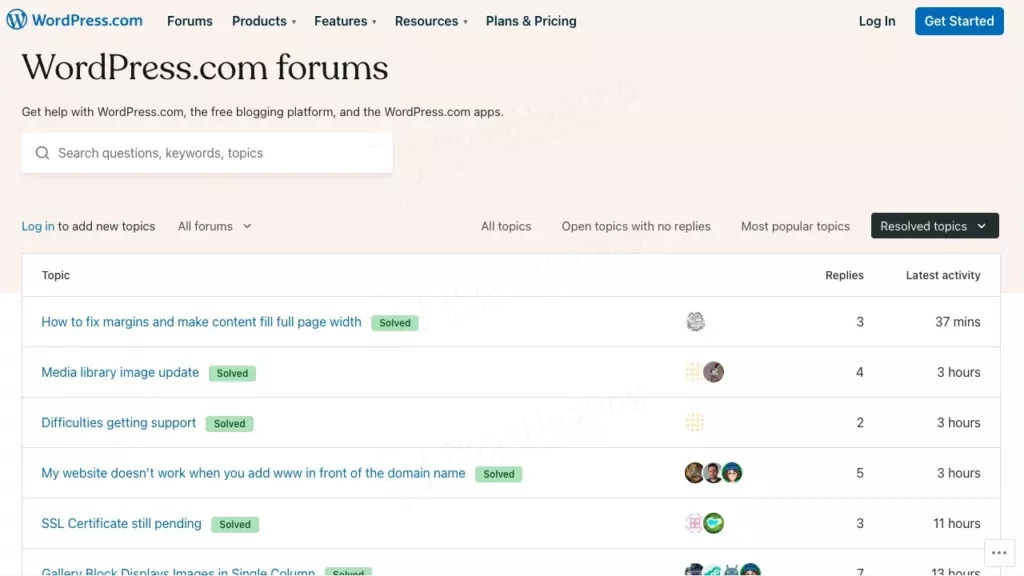
Additionally, since WordPress is so widely used, many hosting providers offer specialized WordPress support. Managed WordPress hosting services often provide assistance with updates, security, and performance optimization.
Wix provides dedicated customer support across its plans. This means that regardless of the plan you choose, you’ll have access to Wix’s support team to help you with technical issues, site management, and any challenges you encounter.
However, Wix’s community might not be as extensive as WordPress’s, which means that finding solutions to more specific or complex issues might be slightly more challenging.
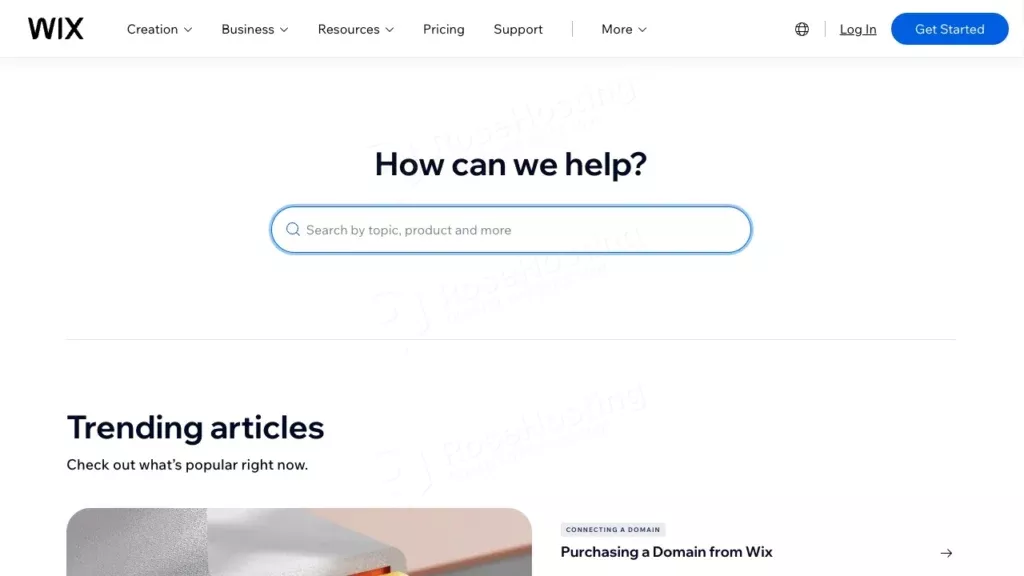
Winner: In terms of dedicated customer support, Wix holds the advantage due to its availability across plans. However, the vast and active WordPress community ensures a wealth of resources for troubleshooting and learning. The playing field is leveled even more so if you opt for a managed WordPress provider.
Security: Wix vs. WordPress
WordPress’s open-source nature means that it benefits from a massive community of developers who continuously work on improving security. However, this also makes it a potential target for malicious attacks. To counteract this, WordPress has implemented several security measures:
WordPress Security Measures
- Regular Updates – WordPress frequently releases updates to address vulnerabilities and enhance security. Keeping your WordPress core, themes, and plugins up-to-date is crucial to preventing security breaches.
- Strong User Authentication – WordPress requires robust passwords and supports two-factor authentication (2FA), adding an extra layer of security to your login process.
- Security Plugins – The WordPress plugin system includes plugins like Wordfence and Sucuri, which offer features such as firewall protection, malware scanning, and login attempt monitoring.
- Secure Hosting – Choosing a reputable and secure hosting provider further fortifies your WordPress site against potential threats.
Wix’s closed environment provides a more controlled security landscape. Since Wix hosts all its websites on its servers, it has the ability to implement strict security measures.
Wix Security Measures
- SSL Encryption – All Wix websites are automatically equipped with SSL certificates, ensuring data encryption during transmission and bolstering your site’s credibility.
- Regular Backups – Wix maintains automatic backups of your website, enabling easy restoration in case of data loss or security breaches.
- DDoS Protection – Wix employs DDoS protection to mitigate the risk of malicious attacks that overwhelm a site’s server.
- Security Monitoring – Wix’s security team constantly monitors its infrastructure for potential threats, addressing issues to maintain site integrity.
While both platforms exhibit a commitment to security, Wix edges ahead due to its closed environment and proactive security measures. Wix’s automatic SSL encryption, regular backups, and DDoS protection offer users a comprehensive security blanket, particularly for those who might not possess deep technical knowledge.
In contrast, while WordPress offers an array of security tools and resources, its vulnerability to attacks due to its open-source nature places more responsibility on users to actively manage security practices. However, with the right combination of security plugins, regular updates, and strong hosting choices, WordPress can be just as secure as Wix.
Scalability: Wix vs. WordPress
Scalability is one of WordPress’s strengths, making it an ideal choice for websites of all sizes. Whether you’re starting a small personal blog or envisioning a large eCommerce platform with thousands of products, WordPress can accommodate your needs.
For smaller websites, shared hosting plans are sufficient. But as your site grows, you can easily upgrade to a dedicated server or a managed WordPress hosting service to handle increased traffic and resource demands.
While Wix is suitable for small to medium-sized websites, it might face limitations when dealing with extremely large-scale projects. As your site grows and traffic increases, you might encounter performance issues. Additionally, Wix’s infrastructure might not be as robust as WordPress’s, which can impact the loading speed and overall performance of your site.
Winner: WordPress emerges as the winner in the scalability category, being capable of adapting to a wide range of project sizes and complexities.
Final Thoughts
As we navigate the intricate terrain of WordPress and Wix, the choice between the two platforms depends on your specific goals, skill level, and project requirements.
WordPress emerges as the champion in categories such as design flexibility, customization, scalability, eCommerce capabilities, and SEO prowess. It empowers those willing to invest time and effort in sculpting a digital masterpiece that stands out.
Wix, on the other hand, is known for its simplicity and user-friendliness. It caters exceptionally well to beginners and those seeking an uncomplicated website-building experience without delving into intricate technicalities.
We personally recommend using WordPress for one simple reason – you have the option to own your website if you self-host it on a VPS or shared hosting. With Wix, you are forever stuck on their platform with no way to ever change hosting provider without losing your entire website.